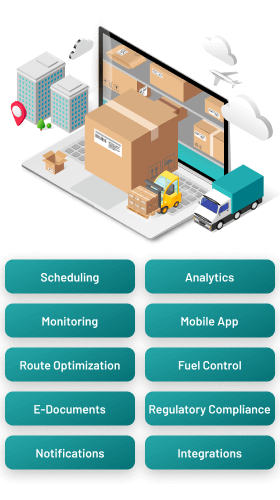Over the years, demand for speedy deliveries has steadily risen among regular consumers and business customers alike. The world is moving at a rapid pace, and efficient transportation of products is crucial in the modern day. Yet, it’s not always easy to ensure timely deliveries.
Hence, companies from the transportation and logistics sector are increasingly looking to implement digital solutions that can help in this regard. As it happens, one such option is trucking dispatch software.
If the name doesn’t ring a bell, don’t worry, we’ll explain everything you need to know below. Concretely, this article will cover:
- What is trucking management software
- Main features to look for
- How to determine you need this solution
Without further ado, let’s dive in.
The Role of Trucking Dispatch Systems
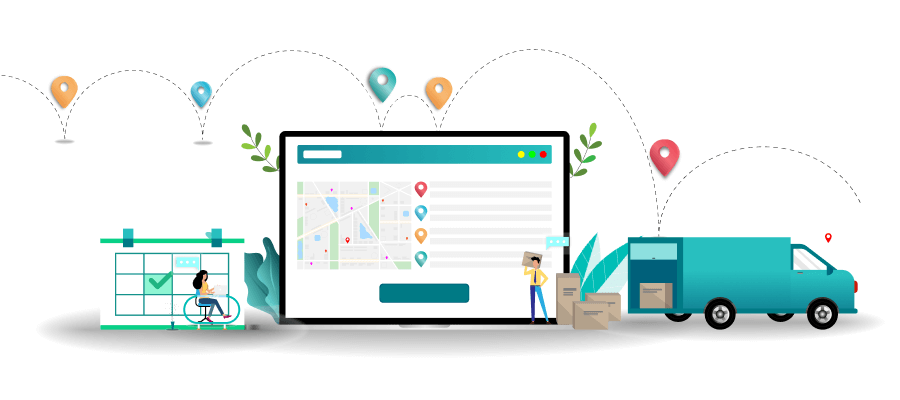
Before we discuss anything else, let’s get the basics out of the way and define trucking dispatch software. In essence, it’s a platform that simplifies the work of transportation and logistics companies by automating truck routing, helping plan and monitor delivery vehicles, and generally optimizing all areas related to consignment operations.
Sometimes, trucking software can also aid with accounting processes, vehicle maintenance, and so on. However, we’ll talk about that in more detail later. For now, let’s just summarize that this type of software delivers the following benefits:
- Reduces costs
- Eliminates manual tasks
- Centralizes operational management
- Improves communication with stakeholders
- Delivers in-depth analytics
User-Driven Approach
Watch our webinar and learn the top ways of reducing poor user satisfaction, low adoption rates, and decreased loyalty.
10 Key Features of Truck Dispatching Software
Now it’s time to look at the key features an effective tool ought to possess. Of course, there can be more or less capabilities, depending on your needs, especially if you choose to build custom trucking management software. However, we are going to cover the ten that are crucial in our team’s opinion.
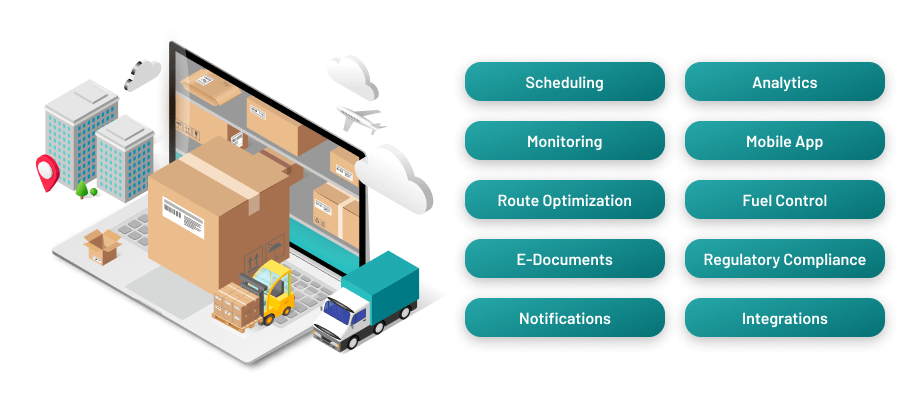
1. Scheduling
To start off, your chosen system must have a scheduling and dispatching feature that makes it easy to quickly organize shipment pick-up and drop-off by providing total visibility of the available trucks and their load capacities. Additionally, to simplify scheduling, the dispatching software should deliver real-time notifications if there are any changes to driver proximity or truck availability.
2. Real-Time Monitoring
Next, your solution should allow employees to easily monitor and track freight movements from the beginning to the end of the delivery process. Here, the truck dispatching system might employ the Internet of Things (IoT) technology to provide a 360-degree view of fleet operations with the most up-to-date information.
Besides tracking movements, the intelligent software can even monitor the conditions under which products are being transported. Thus, ensuring that there is less spoilage for temperature or humidity-sensitive items, for example.
Discover how we developed a Cold Chain Monitoring Solution
3. Route Optimization
As we’ve briefly touched on above, routing difficulties can result in delays and reflect negatively on the bottom line. So, it is of utmost importance that your truck dispatching software has the ability to automatically build optimal routes. These routes should be based on real-time information about weather and traffic conditions as well as the set out goals.
For example, you might want to minimize travel distance or duration. In that case, a smart solution should rely on data science to analyze all relevant factors and adapt the route to fit in with the set out requirements.
4. Electronic Documentation
In an industry as dynamic as transportation, paperwork can be extensive and at times hard to keep track of. Trip sheets, bills of lading, invoices, contracts, rate confirmations, and the like can quickly pile up and overwhelm even the most organized staff members.
Hence, to reduce errors and save time, it’s crucial for your trucking dispatch software to help arrange, store, and share electronic documentation. In fact, it should integrate data from different sources so that all stakeholders have access to the most up-to-date details.
Read up on our team’s effective Data Integration Project for a Consulting Firm
Further, the system should allow drivers to upload digital tickets that hold load information and relevant time stamps, which are crucial for timely payments and invoicing. By digitizing the ticketing process, you can significantly improve efficiency and minimize misunderstanding between everyone involved.
5. Notifications
Another important feature to be on the lookout for are, unsurprisingly, notifications. Of course, the majority of modern mobile or web-based dispatch software will allow you to set all the relevant alerts. However, it’s worth checking that the most important notifications can be configured seamlessly.
For instance, dispatchers might want to receive notices whenever:
- Drivers are idling or speeding
- Smart sensors detect poor conditions inside the truck
- The driver’s ETA changes
- Truck diagnostics discover issues
Besides these, it’s also a good idea to make sure that you can set up custom notifications that suit your business needs more adequately.
6. Analytics
Detailed business intelligence is the cornerstone of any business, and the logistics sector is no exception. As such, the trucking solution you choose to implement should be able to run in-depth analytics and present results in easy-to-interpret, interactive dashboards.
With this feature, visualizing transportation patterns and identifying trends will be a smooth undertaking. Thus, helping make truly data-driven strategic decisions.
7. Mobile App Version
It won’t be news to anyone that we live in a mobile-first world. Portable devices account for more than half of the world’s website traffic, and this is unlikely to change any time soon. So, it’s essentially a must for any web-based dispatch software to have a mobile app version of it.
That way, your team will be able to manage tasks on the go and always stay aware of any updates that occur and may warrant their attention.
Take a look at Velvetech’s Warehouse Management Mobile App Implementation Project
Choosing a Winning App Development Strategy
Watch our webinar to uncover effective mobile development approaches and launch your app.
8. Fuel Management
Controlling fuel consumption and the associated costs is a top priority for many transportation organizations. After all, effective fuel management can significantly reduce expenses and boost profit levels.
Typically, fuel usage can be refined by reducing engine idling, optimizing delivery routes, performing regular preventative maintenance, and generally encouraging safe driving. Since trucking dispatch systems can help with all of these elements, they are often implemented by businesses looking to reduce fuel-related costs.
9. Regulatory Compliance
Another vital feature of trucking dispatch software that you must not overlook is regulatory compliance. Adhering to the transportation safety standards the government has set out is imperative as failure to do so can lead to machinery defects or even significant fines.
So, when assessing the kind of solution you want to implement, don’t forget to check how the vendor ensures compliance with all the major regulations. The providers who are experienced in keeping adherence in check will definitely save you a lot of headaches in the future.
10. Integration with Third-Party Tools
Lastly, any software implemented for a trucking business must have the ability to integrate with third-party tools. It needs to work seamlessly with 3PL systems, accounting solutions, GPS tools, CRM platforms, and the like. This way, 360-degree visibility can be ensured across various logistics functions.
Signs You Need Trucking Industry Software
As a transportation or logistics company, you might already have a system in place to help manage your daily operations. However, an all-encompassing dispatch software might be the perfect next step in your development and worth pursuing nonetheless. If you’re still unsure, let’s take a look at the top three signs indicating that your firm will benefit from such a platform.
Time-Consuming Stakeholder Communication

In the logistics sector, communication among various stakeholders like managers, dispatchers, and drivers must be swift. However, this can be difficult to ensure when not everything is managed by an internal team and interactions aren’t synchronized across different partners. As you can imagine, efficiency can suffer greatly in this scenario.
So, if you’ve been struggling to ensure that all of the relevant stakeholders are informed of any updates to delivery statuses — it might be time to look into freight dispatching software. Primarily because it centralizes information from dispatchers and 3PL partners, synchronizes details on order allotment and delivery tracking, and generally creates clarity over the entire process for everyone involved.
Routing Difficulties
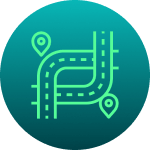
Another major tell-tale sign that indicates dispatching software could benefit your organization is when you frequently experience routing difficulties. Any transportation and logistics firm tries to create the most efficient delivery routes by considering traffic conditions, number of delivery stops, and the like. However, when done manually or without leveraging the latest technologies, unforeseen events can interfere and result in major delays or even accidents.
Can a trucking dispatch system really help with unexpected circumstances? Well, that’s a valid question, and the answer is — to an extent, it can. You see, if you choose to implement a solution that leverages artificial intelligence and machine learning, then it’ll be able to analyze myriads of information and forecast occurrences that a human simply couldn’t have thought of. Thus, helping avoid routing challenges.
Learn more about the Power of AI in Business
High Number of Empty Miles
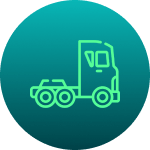
Lastly, it will come as no surprise that minimizing the number of empty miles is a top priority for transportation companies. After all, whenever your truck is traveling without any shipment in tow, it comes at a cost to the business.
Hence, if you’ve observed an increase in empty miles recently, a truck dispatching system should really be worth consideration. It can suggest optimal routes with minimal consignment-free mileage through intelligent analysis that even factors in reverse logistics.
Acquire the Right Trucking Solution for Your Needs
We’ve covered a lot of ground today, but hopefully you’ve gained a better understanding of what trucking dispatch software actually entails. Just remember, there are several must-have features you should be on the lookout for when implementing this kind of a solution.
However, if you’re still a little confused or aren’t sure where to get started — don’t hesitate to reach out to our team. Velvetech’s specialists have spent years delivering impactful transportation and logistics software projects and would be happy to help you with your next initiative.







